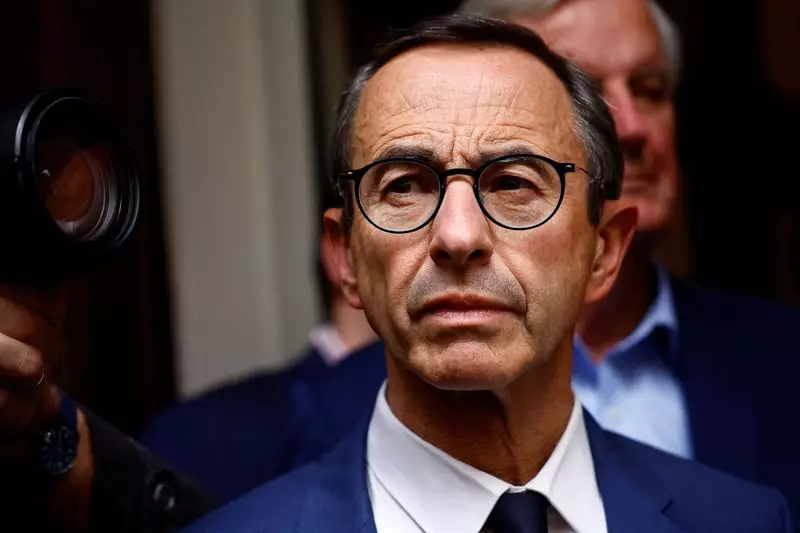In a bold reshuffle, French President Emmanuel Macron recently announced a new cabinet aimed at addressing pressing issues within the country while sustaining a delicate political balance. Each appointment reflects the diverse ideological landscape of contemporary France as the country navigates economic challenges and social upheavals. This article explores the major ministerial appointments and the implications they may have on both domestic and international fronts.
At the forefront of this cabinet is Antoine Armand, the new Minister of Finance. Despite his relative inexperience in the political arena, having only been first elected to parliament in 2022, Armand embodies a modern approach to economics. His prior role as chair of the economic committee in the lower house placed him at the nexus of financial policy-making, focused on steering France’s economic framework. Armand’s academic background, which includes a degree from the renowned École Nationale d’Administration, positions him as a technocrat capable of navigating the complexities of the Ministry of Economics and Finance—often referred to as “Bercy.”
However, his appointment comes at a time when France grapples with a rising budget deficit, requiring immediate attention to budgetary restructuring. Laurent Saint-Martin’s secondment on budgetary matters signals the government’s awareness of the challenges ahead, potentially involving contentious negotiations regarding spending cuts and tax adjustments. The effectiveness of Armand’s tenure will likely hinge on his ability to balance fiscal prudence without inciting public unrest.
Bruno Retailleau’s appointment as Minister of the Interior raises eyebrows given his hard-right political stance and vocal opposition to Macron’s more centrist policies. A seasoned politician, Retailleau has been a prominent figure within the Republicans, advocating for stricter immigration policies and a tougher approach to civil protests. His influence will undoubtedly shift the narrative around immigration in France, with proposed constitutional amendments that may signify a paradigm shift in welfare benefits.
As the new Interior Minister, Retailleau faces the formidable task of maintaining security and public order amid heightened societal tensions. His agenda could potentially lead to polarized debates, particularly with segments of the electorate who value more liberal immigration policies. How Retailleau marries these tougher stances with the realities of governance will be closely scrutinized.
Jean-Noël Barrot’s ascension to Foreign Minister represents a notable shift towards consolidating France’s diplomatic posture, especially within the context of European affairs and international relations. A product of a politically influential family, Barrot brings crucial experience from his previous role as junior minister for European affairs and an understanding of Macron’s broader Eurocentric vision. His position is vital in fostering alliances, particularly as Europe seeks unity amid global challenges like the ongoing conflict in Ukraine.
In tandem, Benjamin Haddad’s appointment as Minister for Europe aligns with this strategy, leveraging his extensive network and fluency in English to enhance France’s diplomatic voice. His ability to galvanize European lawmakers and influence perceptions in Washington reflects a more connected approach to international diplomacy. This pair of appointments aims to establish a cohesive strategy in navigating the complexities of European politics and international relations amid rising tensions.
Lastly, Sébastien Lecornu’s retention as Defence Minister underscores a desire for continuity in national security strategies. As a loyal supporter of Macron, Lecornu’s familiarity with defense issues will be pivotal as France navigates evolving security challenges. His background offers the potential for innovative approaches to defense spending and military engagement strategies, particularly in a landscape influenced by Russia’s actions and terrorism.
The new cabinet illustrates Macron’s intricate balancing act – combining new talent with seasoned politicians, insulating the administration from criticism while addressing the electorate’s diverse expectations. The ramifications of these appointments will be pivotal in shaping France’s immediate future, requiring agility, negotiation, and an adept understanding of an increasingly polarized political landscape. As challenges mount, the cabinet’s performance will determine the effectiveness of Macron’s vision and the sustainability of his government in the face of a discontented public.
Macron’s new cabinet signals a critical juncture for France, where the political will to tackle economic fiscality and national security will be tested. Observers will watch closely as the intricacies of governance entwined with ever-evolving voter sentiments play out in the coming months.

